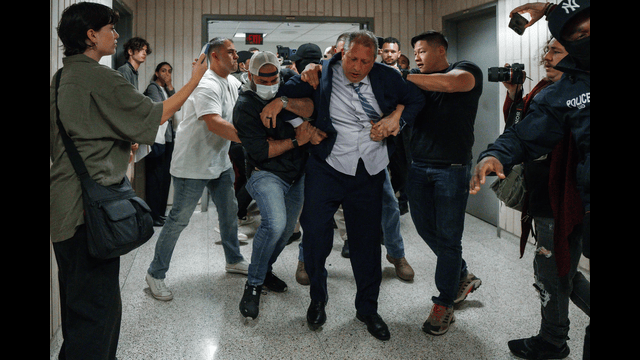
Pierre Poilievre, leader of the Conservative Party of Canada, addresses the media at an event in Saskatoon, Saskatchewan, on Friday, April 25, 2025. The Canadian Press
Pierre Poilievre, leader of the Conservative Party, has outlined his plan for the first 100 days of his government if the Conservatives win the upcoming election. Speaking at a news conference in Saskatoon, Poilievre promised that MPs would be hard at work all summer, passing three key laws aimed at tackling crime, boosting resource production, and improving affordability for Canadians.
“We’re bringing change, and for politicians, that means no summer vacation,” Poilievre said. He also emphasized that, if elected, he would immediately reach out to U.S. President Donald Trump to address the issue of tariffs, calling for their removal and a new deal.
Poilievre criticized the current government’s economic policies, saying that putting tariffs on Canadian industries is harmful. He promised that under his leadership, Canadian taxes would not be used as a burden on businesses, a stance he described as necessary for economic recovery.
One of the major components of Poilievre’s 100-day plan is focused on affordability. He proposed a law called the “Affordability for a Change Act,” which aims to deliver immediate relief to Canadians. The plan includes $54 billion in cuts to government bureaucracy, consultants, foreign aid, and other wasteful spending. In addition, Poilievre promised an income tax cut, which would lower the tax rate on the lowest income bracket from 15% to 12.25% over four years, with the full effect being felt by 2028-2029.
Poilievre also unveiled a “Safe Streets for a Change Act,” which will focus on cracking down on crime. He proposed the largest crime bill in Canadian history, aimed at creating stricter laws to combat criminal activity. He mentioned that current Liberal policies have allowed repeat offenders to go free, leading to overcrowded prisons. Poilievre stated that his tougher laws will keep these offenders behind bars and address the issue of correctional facility overcrowding.
The third part of Poilievre’s 100-day plan focuses on economic development and jobs. He promised to pass the “Bring Home Our Jobs for a Change Act,” which includes repealing Bill C-69, a law Poilievre refers to as the “no development law.” He also plans to make changes to capital gains tax laws to encourage reinvestment in Canadian companies.
Throughout his campaign, Poilievre has traveled across Canada, including stops in Saskatchewan and Alberta. In Saskatchewan, he held a rally with former Conservative leader Andrew Scheer, where he was interrupted by protesters. Poilievre also made a stop in Calgary, where he emphasized the importance of voter turnout in the upcoming election. He warned that if the Liberals win a fourth term, the situation for Canadians will worsen.
As the election nears, Poilievre is calling for the largest voter turnout in Canadian history to ensure the change that he believes Canadians need.















